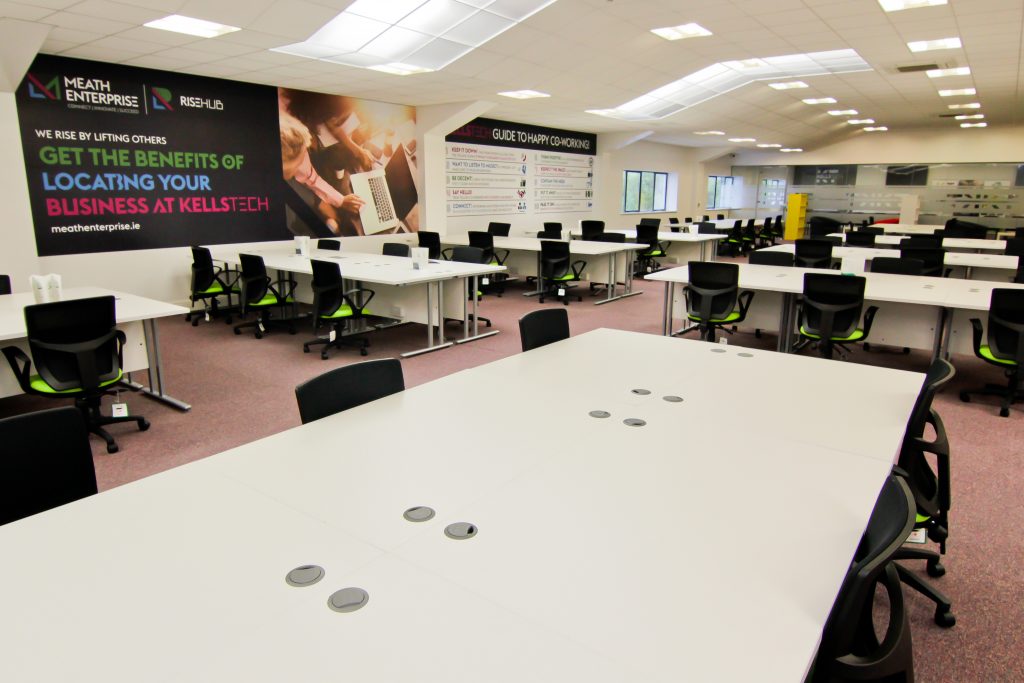
The co-working space in the Kells Tech Hub
Despite the very significant challenges posed by the coronavirus pandemic, Ireland’s community enterprise centres believe they are in prime position to deliver high-quality remote working solutions as the country gradually returns to work.
Entrepreneurship hubs, co-working centres and incubators throughout the country are gearing up to reopen in the coming months with an action plan to increase their capacity to accommodate growing numbers of the country’s workforce as remote working becomes the norm.
A major new analysis of the sector, the Enterprise Centre/Hubs Covid-19 Impact & Recovery Survey, has shone a light on the devastating effects Covid-19 has wrought on enterprise centres in every county, with almost 88% of centres reporting a drop in income of between 21% and 80% as many of their entrepreneur tenants struggle to keep their own businesses afloat.
The research, commissioned earlier this month by the National Association of Community Enterprise Centres (NACEC), examined the impact of the pandemic on enterprise and technology centres, food and digital hubs, co-working/remote working hubs and college/university incubators throughout the country.
Among its stark findings are that while the vast majority of hubs have seen tenants closing their doors temporarily (83.5%), one-third (33%) of centres say some tenants have shuttered their businesses permanently.
Centres have experienced a major decline in income as a result, while some two-thirds of respondents are also under pressure to provide tenants with financial relief in the form of rent deferrals and reductions. Although over half of centres (51%) said they expected no job losses among their own staff as a result of the deterioration in economic activity, some 31% said they anticipated reducing employment by 20%.
Notwithstanding the gloomy backdrop the survey paints, centres are already putting plans in place to transition back to operations – with some co-working facilities looking to get back up and running in phase 2 of the Government’s five-stage plan beginning on 8th June, with more planning to scale up with limited numbers of hot-deskers between phases 4 or 5 later in the summer.
Enterprise centres and hubs say they want to get back to leading and enabling enterprise development and creating connected environments for working and co-working as soon as possible, subject to changing workplace safety and reconfiguring workspaces to promote physical distancing.
They are firmly of the belief that, as remote working is brought more into the mainstream, existing enterprise centres and technology hubs are strongly positioned to offer realistic and cost-effective options for city-based companies seeking to provide their employees with desks closer to their homes.
Gary O’Meara, CEO of Meath Enterprise and chairperson of NACEC, said: “This crisis has seen remote working increasingly accepted as a realistic proposition by many employers and employees who previously may not have been open to the workability of remote as a viable alternative. We see our offer strengthened in that regard. We envisage co-working will increase as businesses downsize to reduce costs.”
He added that there were enormous opportunities for enterprise centres across the country to act as powerhouses of regional job creation and to support both start-ups and remote workers seeking to avoid commutes to urban centres, assuming facilities and services can be adapted to take account of the new workplace realities.
However, in order to ensure their survival and growth, Ireland’s enterprise hubs say a relatively modest stimulus package of €5 million is required to help adapt facilities and workspaces to take advantage of the opportunities that lie ahead.
This figure also includes support for a national hot desk booking system, community-based training facilities and technology to assist businesses navigate their way out of the current crisis effectively, as well as other supports such as rent subsidies and the delivery of restart acceleration programmes for small businesses.
According to the NACEC Strategic Plan 2019-2021 launched last year, its enterprise hub members supported over 5,500 jobs in over 1,800 businesses, with a salary contribution to the economy of €247.5 million per annum.
Posted 20th May 2020